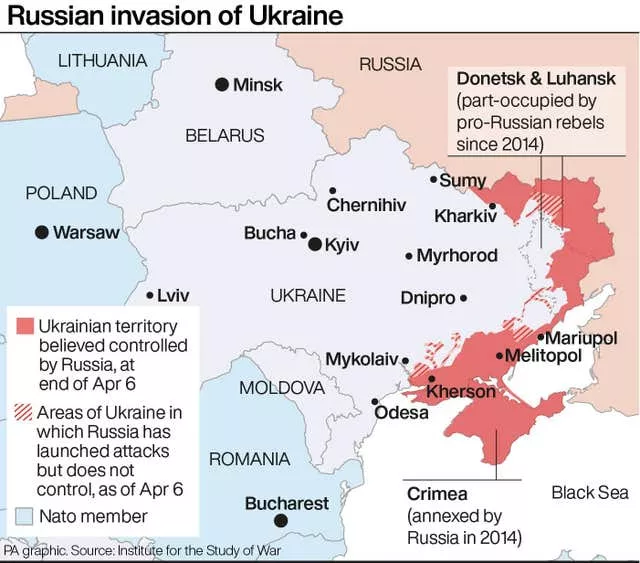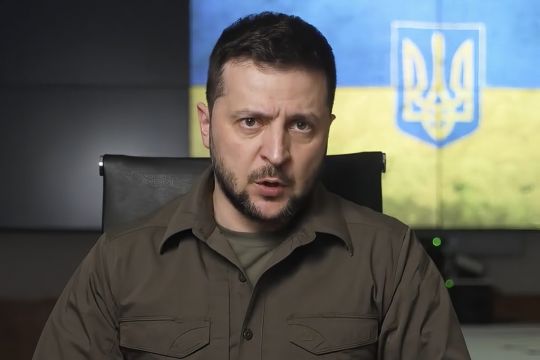Ukrainian President Volodymyr Zelensky has said he wants a tough global response to Russia after its forces fired a missile at a crowded train station, killing at least 52 people.
Mr Zelensky’s voice rose in anger during his nightly address on Friday, when he said the strike on the Kramatorsk train station, where 4,000 people were trying to flee a looming Russian offensive in the east, amounted to another war crime.
Five children were among the dead and dozens of people were severely injured, Ukrainian officials said.

“All world efforts will be directed to establish every minute of who did what, who gave what orders, where the missile came from, who transported it, who gave the command and how this strike was agreed,” the president said.
Russia denied it was responsible for the strike and accused Ukraine’s military of firing the missile as a false-flag operation so Moscow would be blamed for civilian deaths.
Ukraine’s state railway company said that residents of the country’s contested Donbas region, where Russia has refocused its forces after failing to take over the Ukrainian capital, Kyiv, could flee through other train stations on Saturday.
“The railways do not stop the task of taking everyone to safety,” the statement on the messaging app Telegram said.
Photos taken after the attack showed bodies covered with tarpaulins and the remnants of a rocket painted with the words “For the children” in Russian.
The Russian phrasing seemed to suggest the missile was sent to avenge the loss or subjugation of children, although its exact meaning remained unclear.
The strike seemed to shock world leaders.
“There are almost no words for it,” European Union Commission President Ursula von der Leyen told reporters during a visit to Ukraine. “The cynical behaviour (by Russia) has almost no benchmark any more.”

The attack came as workers elsewhere in the country unearthed bodies from a mass grave in Bucha, a town near Kyiv, where graphic evidence of dozens of killings emerged following the withdrawal of Russian forces.
“Like the massacres in Bucha, like many other Russian war crimes, the missile attack on Kramatorsk should be one of the charges at the tribunal that must be held,” Mr Zelensky said.
After failing to take Kyiv in the face of stiff resistance, Russian forces have set their sights on the eastern Donbas region, the mostly Russian-speaking, industrial area where Moscow-backed rebels have been fighting Ukrainian forces for eight years and control some places.
Although the train station is in Ukrainian government-controlled territory in the Donbas, Russia accused Ukraine of carrying out the attack, as did the region’s Moscow-backed separatists who work closely with Russian troops.

Western experts, however, dismissed Kremlin spokesperson Dmitry Peskov’s assertion that Russian forces “do not use” that type of missile.
A Western official said Russia’s forces have used the missile — and that given the strike’s location and impact, it was likely Russia’s.
Justin Bronk, a research fellow at the Royal United Services Institute in London, added that only Russia would have reason to target railway infrastructure in the Donbas, as it is critical for the Ukrainian military’s efforts to reinforce its units.
Mr Bronk pointed to other occasions when Russian authorities have tried to deflect blame by claiming their forces no longer use an older weapon “to kind of muddy the waters and try and create doubt”. He suggested Russia specifically chose the missile type because Ukraine also possesses them.
Ukrainian authorities and Western officials have repeatedly accused Russian forces of atrocities in the war that began on February 24.
More than 4 million Ukrainians have fled the country, and millions more have been displaced. Some of the grisliest evidence has been found in towns around Ukraine’s capital, Kyiv, from which Russian President Vladimir Putin’s troops pulled back in recent days.
In Bucha, Mayor Anatoliy Fedoruk has said investigators found at least three sites of mass shootings of civilians and were still finding bodies in yards, parks and city squares — 90% of whom were shot.
Russia has falsely claimed that the scenes in Bucha were staged.







